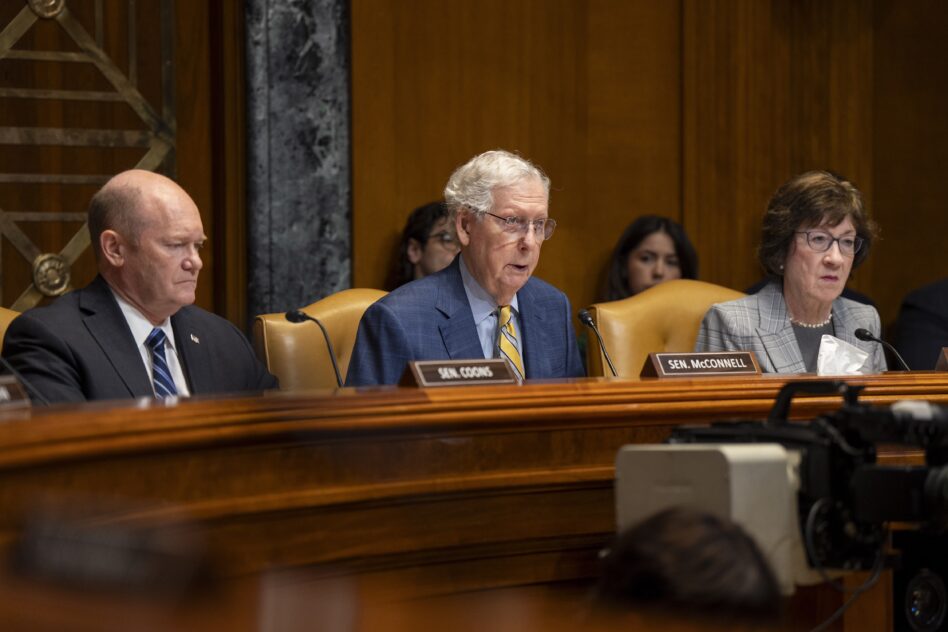The budget drama on the Hill continues. Yesterday, the Senate Appropriations Committee approved its $852.5B defense spending bill for FY26, providing a $21.7 billion (2.6%) boost in spending over Trump’s budget, plus a big ol’ “hell no” to some of the President’s policy priorities.
Among the starkest differences between the Senate’s appropriations bill and the administration’s FY26 budget request is support for Ukraine—the Senate allocated a whole $1B to Ukraine and the Baltics.
The Senate bill is also at odds with the defense spending passed by the House, which stayed in line with Trump’s $831.5B request.
Trouble in paradise, eh?
Here’s a breakdown of some of the most interesting bits.
The road to Kyiv: In case you’ve been living under a rock since January, the Trump administration is not a huge fan of foreign aid—and that’s been reflected in its budget requests.
The Senate, however, stuck to its ally-backing guns, allocating a whole $5.3B to “strengthen security cooperation programs, reinforcing the strategic importance of supporting vulnerable partners as a core U.S. national security interest.” The bill includes:
- $800M for the Ukraine Security Assistance Initiative (USAI)
- $225M for the Baltic Security Initiative
- $1.5B for the Indo‑Pacific Security Initiative
- $500M for U.S.‑Israeli Cooperative Missile Defense Programs (including Iron Dome, David’s Sling, Arrow systems)
- Increased funding for Bahrain and Jordan
Trump’s favorite frenemy Sen. Mitch McConnell (R-KY), who chairs the panel’s defense subcommittee, pushed hard for aid to Kyiv. “Shutting off engagement with Ukraine would undermine our military’s efforts to prepare for the modern battlefield,” he said during the appropriations committee meeting.
In the lab: The Senate also allocated a whole $171.3B for procurement and $140.5B for RDT&E. Increases over the president’s budget request include:
- $216M for drone and counter-drone capabilities
- $4.6B for air and missile defense
- $5.2B for munitions
- $923M for THAAD acquisition
- $450M for the SM-3 block 1B missile, which was zeroed out in the administration’s request
- $280M for F-135 spare engines and $500M for F-35 sustainment
Interestingly, the Senate bill allocates funding to the Navy’s ever-controversial next-gen fighter, the F/A-XX ($1.4B) and everyone’s favorite plane, the E-7 Wedgetail ($647M). It ain’t dead yet.
At a service level, the Navy won out big in the Senate version, while the Space Force’s budget stayed flat.
Navy: $70.8B for procurement, and $27.4B for R&D, including:
- An $8.7B boost for shipbuilding to a total of $29.3B, including $1.9B for Virginia-class subs and $1.3B for the Columbia-class flavor
- $100M to develop the Navy’s advanced hypersonic air-to-surface missile
- The aforementioned $1.4B for the F/A-XX
- $650M for a mysterious classified program
Army: $29.1B for procurement and $15.3B for R&D, including:
- A $219.8M boost for 15 Abrams tanks
- An increase of $360M for 12 AH-64E aircraft
- A $175M boost to the Improved Turbine Engine Program
Air Force: $59.8B for procurement and $49.3B for R&D, including:
- $2.6B for the Sentine; ICBM program, in line with the administration’s request
- An $800M increase for a “high-priority classified program”
- A boost of $1.5B for eight C-130J aircraft for the Air National Guard
- A $619M increase for two EA-37B Compass Call aircraft to “expand the Air Force’s electronic attack capacity”
Space Force: $3.6B for procurement and $15.1B for R&D, in line with the president’s request. Increases included:
- $500M to “continue development of Space Development Agency’s Tranche 3 Transport Layer”
- $256M for classified programs for Space Force, U.S. Space Command, and U.S. Indo-Pacific Command
In a briefing to reporters, Sen. Chris Coons (D-CT), the top Democrat on the committee, said that working with the administration had been “chaotic at best” and, “it was striking that the president’s request was essentially a cut.” Coons and other senators also scolded the administration for what they called “mistakes” in its request, which he said they had to correct “at the cost of billions of dollars in different platforms and programs.”

